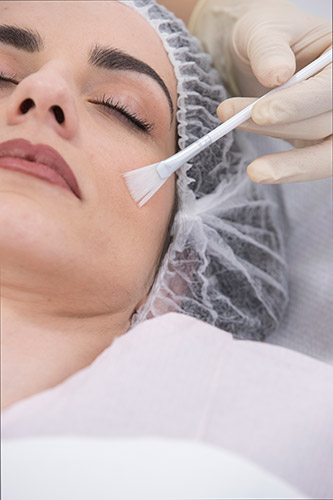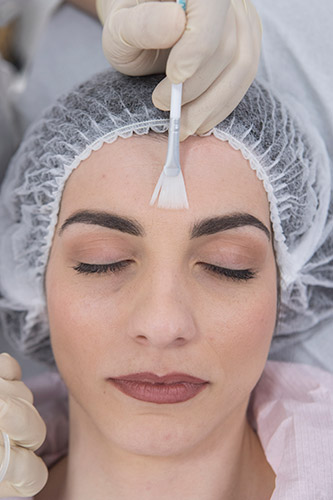Chemical peel
Peeling or chemical peel is the use of chemicals on the skin in order to improve
- skin texture,
- small wrinkles
- dyschromia, melasma, freckles, chloasma
- active acne but also acne scars on the face or any other part of the body
- stretch marks
Depending on the product and technique of chemical peel, there is also penetration of a different thickness on the skin. Superficial peelings result in a mild redness that subsides about 30 minutes after the treatment. Deeper peelings may cause redness and skin exfoliation for 3-4 days after treatment.
Chemical peels are repeated at regular intervals, usually every 3 weeks in order to achieve the desired result and it is probably the oldest act of medical aesthetics. The result is to cause gradual keratolysis, stimulation of cell proliferation, reconstruction and regulation of skin PH. It can be applied to any part of the body. Sun exposure must be avoided for 10 days after treatment.
Peeling – Chemical peel – Procedure
The procedure takes place in the doctor’s personal clinic. The skin should be clean and dry. The substance is spread with the help of a brush depending on what we want to achieve but also depending on what substance we use. Then the substance is removed with water or neutralized with medical cream. Then the patient leaves the clinic only with the face cream. No makeup is recommended right afterward. It is essential for the patient to use sunscreen protection for 10 days after application.
In all cases, the patient may notice a glow on his/her skin but also an improvement in acne scarring, wrinkles and dyschromia.


Preparation before surgery
- Photographs of the area are taken.
- Classical preoperative check-up includes blood tests, chest X-ray, and cardiac evaluation.
- 12 hours before surgery do not eat anything.
- 6 hours before surgery do not drink anything.
- On the morning of the operation do not take any medication without the anesthesiologist's approval.
- Alcohol should be stopped 1 week before surgery.
- In the case of general anesthesia, it is necessary to meet with the anesthesiologist before the surgery.
- Report previous anesthetic experiences, either positive or negative and inform him/her of any health problems or medication you are taking.
- Do not take aspirin, anti-inflammatory drugs, or herbal supplements 10 days before the surgery, as they increase the possibility of bleeding during and after surgery.
- 3 days before the surgery and every day after washing your face or body with medicated soap, depending on the planned surgery.
General Complications after surgery
Complications in plastic surgery operations are not common but it is necessary to be aware of them at the first appointment.
- Hematoma: A hematoma is the accumulation of blood in the wound.
- Inflammation: To prevent inflammation, antibiotics are administered during surgery.
- Poor wound healing: If the incision in the operated site is more prominent than expected, it can be corrected 6 months to a year after surgery with local anesthesia. In some cases, the appearance of keloids is possible where specific treatment is needed.
- Skin necrosis: It is more likely in heavy smokers.
- Pulmonary embolism and thrombosis.
This text may give rise to new questions. We are at your disposal for any other information.



